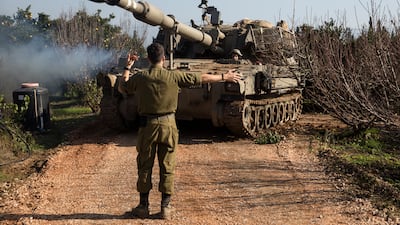Live updates: Follow the latest news on Israel-Gaza
The possibility of an all-out war between Lebanon and Israel continues to grow in the absence of a diplomatic solution, Israeli Senior Minister Benny Gantz hinted on Wednesday, which saw some of the most intense cross-border battles since the frontier conflict began on October 8.
“The situation on Israel’s northern border demands change,” Mr Gantz told reporters as he toured Israel’s northern border with Lebanon.
Mr Gantz indicated the possibility of increased military escalation against Hezbollah, the Iran-backed group that has engaged Israel in a cross-border conflict since October 8 in an attempt to divert Israel from its assault on the Gaza Strip. Hezbollah is a strategic ally of Hamas, which governs Gaza and also receives Iranian backing.
“The stopwatch for a diplomatic solution is running out,” he said. “If the world and the Lebanese government don’t act to prevent the fire towards northern communities and to distance Hezbollah from the border, the [Israeli army] will do it.”
Diplomatic allies of Israel, including the US and France, have tried to negotiate a deal that would lead to Hezbollah retreating north of the Litani River, reportedly in exchange for territorial concessions – a proposal Hezbollah has rejected.
But as western officials have stepped up efforts between Lebanon and Israel to implement the long-neglected UN Resolution 1701 – which calls for Israel to withdraw from occupied Lebanese territory and for Hezbollah to disarm – the conflict continues to escalate.
On Wednesday evening, Hezbollah fired the largest volleys of rockets and drones into Israel since the conflict began, as a “response to the Israeli enemy’s repeated crimes and its targeting of civilian homes in Bint Jbeil”, the group said.

Israel’s attack on a Bint Jbeil residence killed one Hezbollah fighter and two civilians, the militant’s brother and his sister-in-law.
At least 150 people have been killed in Lebanon since October 8 – largely Hezbollah fighters but also some fighters in allied Palestinian groups, and at least 19 civilians.
In Israel, the death toll is nine soldiers and four civilians. However, the number could be higher because the Israeli military does not typically disclose updated casualty figures related to the border conflict.
The strikes on Wednesday, where at least 50 Katshuya rockets were fired into the northern Israeli settlements of Kiryat Shimona and Rosh Hanikra, caused no reported casualties but were seen as a warning to Israel that civilian deaths would invite severe retaliation.
Hezbollah leader Hassan Nasrallah had previously threatened in November an equation of “a civilian for a civilian”.

Despite initiating the conflict, Hezbollah has remained relatively restrained throughout the last two-and-a-half months, striking mostly Israeli military targets and wary of igniting a full-scale war in Lebanon. Although largely confined to border areas on either side, Israel has consistently intensified its responses and has occasionally struck deeper into south Lebanon.
Hezbollah started as an insurgency in the 1980s but has become embedded in Lebanon’s government and parliament as a political party. The Iran-backed group also separately operates a paramilitary commonly thought to be stronger than the Lebanese army.
The group seeks to balance its political gains while attempting to provide military support to Hamas in Gaza.
The intensification of the cross-border skirmishes comes on the heels of the assassination of a senior commander within the Iranian Islamic Revolutionary Guard Corps (IRGC) in Syria, which Iran has attributed to Israel, promising retaliation.
On Wednesday, Israeli Foreign Minister Eli Cohen warned that Mr Nasrallah “must understand that he is next in line [for assassination]” if he does not work towards implementing UN Resolution 1701.
If diplomatic avenues prove fruitless, “the state of Israel is unequivocal – every conceivable option is under consideration,” he said. “Our paramount goal is to safeguard our residents and facilitate the return of those living near the northern border settlements.”

The daily skirmishes have displaced tens of thousands of Lebanese and Israelis from their homes along the border: over 72,000 in Lebanon, according to the International Organisation for Migration, and tens of thousands in Israel.
Villages on either side of the border have become ghost towns.
Last week, the mayor of Kiryat Shmona, Avichai Stern, said he would not allow residents to return to the town if Hezbollah were to remain in southern Lebanon.
“If necessary, I will lie down on Route 90, block the road, and not let the residents return to being sheep for the slaughter,” he told Israeli state-owned radio station KAN Reshet Bet.
“We all expect and want to return home, but the Radwan force is sitting along the fence. This reality must change, if not, we will not be able to return,” said Mr Stern.
But deputy secretary-general of Hezbollah Naim Qassem last week doubled down on the party’s vow that Hezbollah would not cease its attacks until the war in Gaza ends.
“If Israel expands its aggression, we will fight back hard,” he said. “No Israeli, American, or international threats will affect us.”


